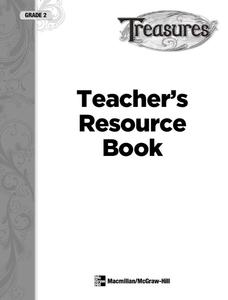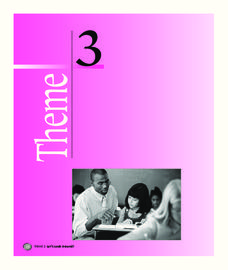Great Schools
Different Types of Writing
What type of writing is this? Learners read a brief introduction to various types of text: instructions, explanations, poems, folk tales, novels, informative, and arguments. The introduction doesn't explain these, so consider going over...
Fluence Learning
Writing About Informational Text: Music and the Brain
Even if you've never picked up a musical instrument, chances are that music has directly impacted your mental and emotional development. Sixth graders engage in a reading activity in which they read two articles on the impact of music on...
McGraw Hill
Phonics Teachers Resource Book
Looking to improve your classes literacy program? Then look no further. This comprehensive collection of resources includes worksheets and activities covering everything from r-controlled vowels and consonant digraphs, to the different...
National Council of Teachers of English
Writing Acrostic Poems with Thematically Related Texts in the Content Areas
Scholars scour thematically aligned texts to gather a bank of words they can use in an original acrostic poem.
Dawgeared.com
Book Review
Reflect on your reading with a book review form. After finishing a novel or short story, kids choose the correct genre and discuss their favorite part. They also decide which part they would change, and whether or not they would...
PBS
Reading Adventure Pack: Rocks
A Reading Adventure Pack focuses on rocks. Scholars participate in three activities after reading a fiction and nonfiction text—The Jade Stone, a Chinese folktale adapted by Caryn Yacowitz, and Rocks in His Head by Carol Otis Hurst....
Baruch College Writing Center
Summarizing, Paraphrasing, and Quoting Workshop
What's the difference between summarizing and paraphrasing? Show class members how to find the main ideas from informational text and condense it, restate it, or quote it directly with a series of educational activities based on two...
Houghton Mifflin Harcourt
Let’s Look Around!: Challenge Activities (Theme 3)
Let's Look Around! is the theme of a unit that offers a plethora of challenge activities. Enhance your scholars' learning experiences and reinforce concepts with activities such as writing a book about farm animals, an imaginary place,...
Scholastic
Prescription Pain Medication: What You Need to Know
The national epidemic of opioid addiction is making its way into high school populations. Educate the learners in your class about the ways prescription opioids can both block pain and deliver large amounts of dopamine that make it very...
Prestwick House
Wuthering Heights
How many ways can you break down a classic novel? Based on the acclaimed Romantic-period novel by Emily Bronte, the Wuthering Heights activity pack includes a pre-reading exercise. Next, learners create a resume for one of the...
Hood River County School District
Text Structure: Features and Organization
Teach learners how to interact with both fiction and non-fiction text with a packet of activities and worksheets. After looking over text structure and the difference in text features between different types of writing, readers analyze...
Syracuse City School District
Summary of Fiction and Non-Fiction Text
Somebody Wanted But So Then (SWBST)? Yes! Here's a great strategy for teaching young readers how to summarize narrative text. In addition, the packet includes exercises that show kids how to summarize nonfiction text using the classic...
DePaul University
Chicago Changes
Scholars determine statements as fact or opinion in a practice page consisting of two reading passages followed by multiple choice and short answer questions. Fact and opinion passages detail information about Chicago and Ethiopia.














